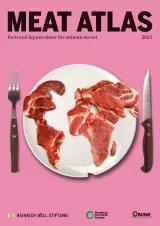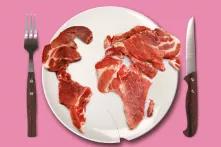
Vegan and vegetarian alternatives to meat are gaining popularity fast – making them tastier for big firms, too. Competition
is likely to flare up around in-vitro meat: start-ups developing lab-grown products are sprouting everywhere.

The market for meat substitutes is changing faster than ever before. Experts predict a global annual growth in plant-based alternatives of 20 to 30 percent in the coming years. Worldwide sales already totalled 4.6 billion US dollars in 2017. That is still peanuts compared to the trillion-dollar global market for meat. But that market is growing much more slowly, and is even stagnating in some countries.
Alternatives to meat are becoming more popular for several reasons. The meat industry is coming under criticism for its working conditions, the livestock industry that it is based on, and its impact on the climate and environment. At the same time, meat alternatives have improved both technically and in terms of their taste and texture, and a wide range of different products is now on offer.
Products that have been available for years, such as seitan (made from wheat gluten), Quorn (fermented fungal protein) and tofu have been joined on supermarket shelves by new ones that closely resemble real meat. These contain proteins that are modified to resemble muscle fibres. New ingredients are also coming to the fore, such as proteins from peas and lupins, or heme proteins derived from plants which, like the hemoglobin in blood, give the finished foodstuff a reddish hue and a meaty taste.
In-vitro meat is not yet in supermarkets, but it is on the front burner for investors. By the end of 2019, 55 firms were already involved in creating laboratory meat products from animal stem cells. Twenty of these firms were infant start-ups founded that same year. In December 2020, Singapore became the first country in the world to approve lab-grown meat for sale, following tests by its food authorities.
The role that meat substitutes will play globally depends largely on how demand develops and whether consumers accept these products. In 2021, a review of 91 scientific articles by Wageningen Economic Research in the Netherlands found that consumer acceptance depended on the meat alternative in question. The acceptance of insect-based products was lowest compared to conventional meat, followed by cultured meat. Pulses and plant-based alternative proteins were the most readily accepted. Factors influencing acceptance included taste and health, familiarity, attitudes, food neophobia (the fear of unfamiliar food), disgust, and social norms.
Compared to conventional meat, substitutes are in general a lot more environmentally friendly. Purely plant-based meat substitutes – items that also contain no eggs or milk – score the best. Compared to beef, their production emits 90 percent less greenhouse gas and requires much less water and land. But such products are often highly processed and contain many additives. Insect-based meat substitutes rate somewhat lower than plant-based products in studies. The health and environmental impacts of in-vitro meat are still difficult to assess, as the research is still in its infancy.
Whether meat substitutes will determine the food system of the future depends on which companies will shape the market, which in turn depends on future agriculture policies and financial muscle. The market presence of large and established players may lead to their products gaining acceptance more quickly. The size and number of firms also influences the diversity or monopolization of the market – with all the associated consequences. A large number of new players and start-ups are currently jostling for position on the market. Large corporations from the technology and food sectors, such as Google, Nestlé and Cargill, are investing. Pharmaceutical companies are also becoming active and are developing culture media for the production of in-vitro meat.
PHW Group is one example. The largest German poultry grower and processor has gone into partnership with Beyond Meat as well as Super Meats, which is working on in-vitro poultry meat production. North America’s biggest meat producer, Tyson, has also invested in Beyond Meat and has introduced its own brand of meat substitutes, called Raised & Rooted. The agricultural group Cargill has taken a stake in Memphis Meats, an in-vitro meat firm. The food giant Nestlé has launched a vegan range under the brand “Garden Gourmet”. And in November 2020, McDonald’s announced a vegan burger: the “McPlant” was first tested in Canada and is on sale in Europe now.
The animal welfare organization PETA does not want to wait for similar steps to be taken by other companies. In May 2020, it bought shares in the meat firms Tyson and Smithfields so it can play the role of a critical shareholder and encourage the companies to make a stronger commitment to plant-based meat substitutes.

